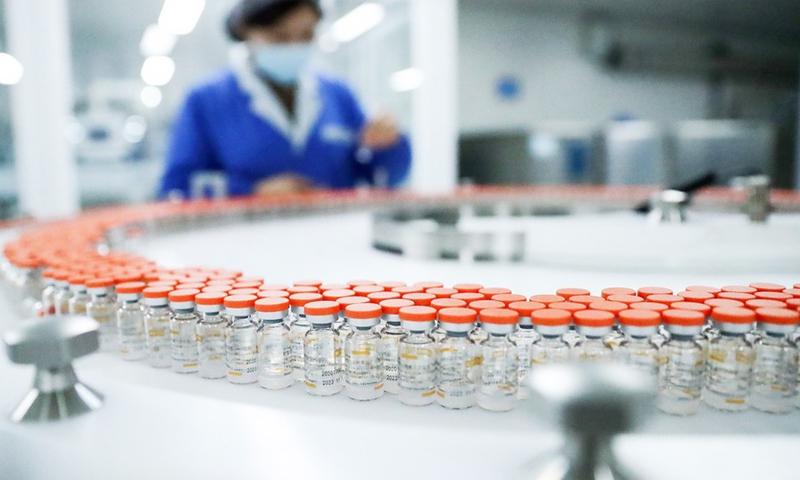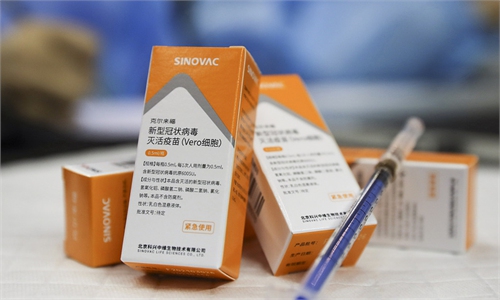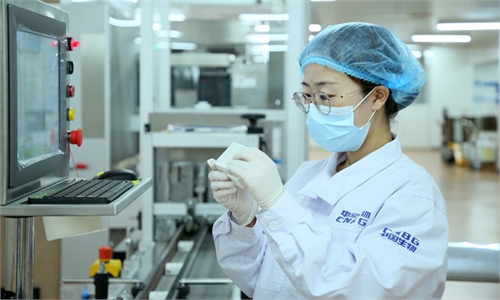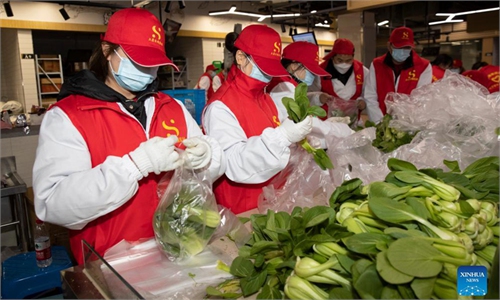Three shots of Sinovac vaccine show a 94% neutralizing antibody positive rate against Omicron: company

A staff member checks tags on vials of COVID-19 vaccine at a packing line of Sinovac Life Sciences Co., Ltd. in Beijing, capital of China, Dec 23, 2020. Photo:Xinhua
The latest study shows three shots of Chinese biotech firm Sinovac's inactivated vaccine can lead to a 94 percent neutralizing antibody rate against the Omicron variant, while the rate after two shots is 35 percent, the Global Times learned from the company on Wednesday.
The study was conducted by the company on 20 people who received two shots and another 48 who received three shots. Seven in the first group and 45 in the second tested positive in neutralizing antibodies against the Omicron variant, the company said in a statement to the Global Times.
Sinovac said that the data demonstrated that the administration of a booster shot of its vaccine can effectively enhance the vaccine's neutralizing capacity to the Omicron variant, read the statement.
The Omicron variant, first discovered in early November, has been reported in 77 countries and regions, according to the World Health Organization.
Britain recorded the first death due to the variant, local media reported on Monday. The Chinese mainland also reported two cases as of Tuesday.
The Omicron variant reportedly has strong transmissibility and immune escape capacity, leading to concerns over vaccine efficacy against it.
A research team led by Yuen Kwok-yung of the University of Hong Kong published a paper on the pre-review website medrxiv.org on Monday. The paper, entitled Neutralization of SARS-CoV-2 Omicron variant by sera from BNT162b2 or Coronavac, concludes that vaccine recipients Omicron variant escapes neutralizing antibodies elicited by BNT162b2 - Pfizer's vaccine - or CoronaVac - Sinovac's vaccine.
Sinovac said they recently obtained two Omicron variants from Hong Kong authorities and research teams. The abovementioned study was conducted on one of the variants.
The company said it is still studying the other variant, noting that it is also conducting another study on how the Omicron can affect its vaccine efficacy at different times following vaccination.
According to a previous statement from Sinovac, the company obtained on December 5 the specimens of nasopharyngeal swabs of an infected individual who contracted the Omicron variant with the assistance and support of related departments from the mainland government and the Hong Kong regional government. The company cooperated with the research team led by Qin Chuan, director of the Institute of Laboratory Animal Sciences at the Chinese Academy of Medical Sciences, and Peking Union Medical College, and launched studies on full gene sequencing and work on virus strain isolation.
With a cooperation agreement signed separately by Sinovac with the research team led by Yuen, other samples of isolated Omicron variants were also delivered to Beijing on December 9 and research on the variant was launched at the P3 laboratory of the Institute of Laboratory Animal Sciences at the Chinese Academy of Medical Sciences and Peking Union Medical College.
Yuen's team successfully isolated the Omicron variant on November 29, the first research team in Asia to do so.
The team exported the isolated virus to the Chinese Center for Disease Control and Prevention as well as Chinese vaccine manufacturers Sinovac and China National Biotec Group for research on the variant and the development of vaccines targeting Omicron, HKU said in a statement on Monday.
Separately, the team is also working with China-based Wantai Biological Pharmacy for the development of an intranasal vaccine for COVID-19. A phase two clinical trial of the vaccine in Hong Kong and a phase three trial in South Africa and the Philippines will start soon, according to the HKU.
It is also working with overseas research institutes to export to them the virus isolate for research purposes, read the HKU statement.



